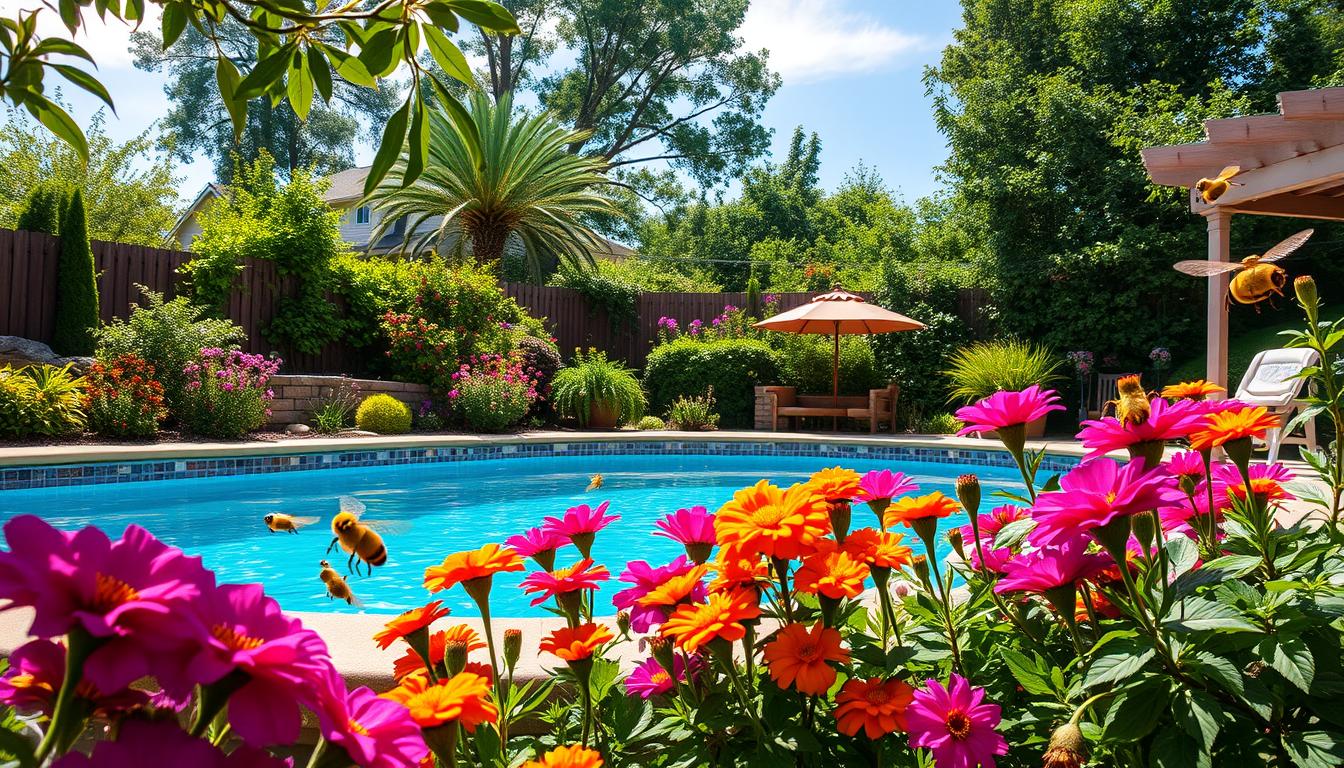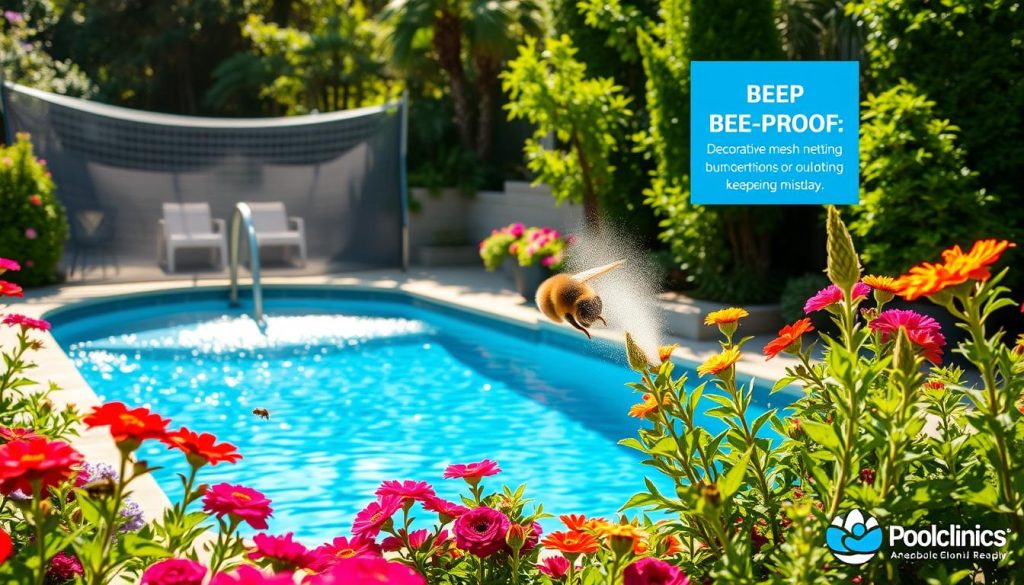
Enjoying a peaceful day by the pool can be ruined by buzzing bees and wasps. These pollinators are vital for our ecosystem. However, their presence near pools can be annoying and potentially dangerous.
Fortunately, we can use simple strategies to keep bees away without harming them. These methods can create a more enjoyable, bee-free swimming environment for everyone.
Bees and wasps seek out pools for water during hot summer months. They need it to survive and cool their hives. The smell of chlorine and pool salts can also attract them.
While we can’t completely eliminate bees near pools, we can reduce their numbers. There are several effective pool bee control methods we can use.
We’ll explore why bees are drawn to pools and how to keep them away. We’ll cover removing flowering plants and using pool jets. We’ll also discuss providing alternative water sources and fixing leaks.
These strategies can help minimize bee and wasp presence near pools. By using them, you can enjoy a more peaceful, sting-free summer by the water.
Key Takeaways:
- Bees and wasps are attracted to pools for water, especially in hot weather.
- Removing flowering plants near pools can help prevent bees from coming to the area.
- Using pool jets to create water movement can deter bees, as they prefer calm water.
- Providing alternative water sources away from the pool can redirect bees.
- Repairing leaky valves and pipes can eliminate standing water that attracts bees and wasps.
Understanding Bee Behavior Around Pools
Bees are drawn to pools as water sources, especially in hot summers. They prefer calm, shallow water with dry edges. Understanding this helps us create effective bee-free pool strategies.
Bees use pool water to cool their hives and thin honey. They’re attracted to sodium, magnesium, and potassium in pool water. Their front feet have taste receptors to detect salt-rich water quickly.
Saltwater pools may attract more bees than chlorinated ones. This is due to their higher mineral content. Knowing this can help us develop better anti-bee measures for pools.
Why Bees are Attracted to Pools
Honey bees seek out pools as reliable water sources. They need water to cool their hives through evaporation. Bees also use it to thin their honey during hot months.
Bees prefer water that’s easy to access without getting wet. They’re drawn to the minerals in pool water. This includes sodium, magnesium, and potassium found in salt water and mud holes.

Risks Associated with Bees Near Pools
Bees near pools can be a nuisance and pose sting risks. This is especially dangerous for people with bee sting allergies. Even bees that seem dead can still sting when removed from water.
Exhausted or aging bees may fall into pools but still sting. Wasps attracted to food near pools can become aggressive. They may sting if disturbed, adding to the risks.
To keep pools bee-free, it’s crucial to use effective repellents. Implementing anti-bee measures helps maintain a safe swimming environment. This ensures everyone can enjoy the pool without worry.
| Bee Attraction Factors | Risks |
|---|---|
| Water source | Bee stings |
| Salt content (sodium, magnesium, potassium) | Aggressive behavior when disturbed |
| Calm, shallow water with dry edges | Panic stinging when removed from pool |
| Food and drink near pools (wasps) | Allergic reactions to stings |
Preventive Measures to Keep Bees Away
Pool owners can take steps to prevent bees from gathering around swimming areas. By using a few strategies, we can reduce bee presence near pools. This creates a more enjoyable outdoor experience for everyone.
Let’s explore some effective ways to keep bees away. These methods will help create a safer and more relaxing pool environment.
Removing Flowering Landscaping Near Pools
Remove or relocate flowering plants that attract bees near your pool. Bees love colorful, fragrant flowers like lavender, sunflowers, zinnias, and cosmos. Move these plants to another part of your yard.
Create a pollinator garden away from the pool. This gives bees an alternative food source and reduces their activity near the water.
Using Pool Jets to Deter Bees
Bees prefer calm, still water for drinking and collecting. Use pool jets to create movement and small waves on the water surface. This discourages bees from landing and drinking.
Installing jets can be pricey if your pool doesn’t have them. However, it’s an effective bee deterrent and a desirable feature for pool owners.
Providing Alternative Water Sources for Bees
Create a bee watering station away from the pool. Use a shallow dish or birdbath with marbles, small stones, or flower petals. Add a small amount of water to attract bees and prevent drowning.
Mix a teaspoon of salt per gallon of water. This makes the alternative source more appealing to bees. It helps keep them away from swimming pools.
Offering alternative water sources, such as bird baths and sprinklers, can help redirect bees and wasps away from pools.
Repairing Leaky Valves and Pipes
Fix leaky valves, pipes, and other pool equipment. This eliminates small puddles or areas of standing water that attract bees. Bees are drawn to these shallow, accessible water sources.
Promptly repair leaks and keep the area around the pool dry. This reduces bee activity and serves as an effective pool bee repellent.
These preventive measures can significantly reduce bee presence near pools. Combine these anti-bee methods for the best results. This ensures a bee-proof pool environment and a more enjoyable outdoor experience.
How to Stop Bees from Coming to Pool
There are several natural ways to keep bees away from swimming pools. Natural bee repellents, avoiding bright colors, and planting citronella can help. These methods allow you to enjoy your pool without worrying about bees.
Natural Bee Repellents for Outdoor Use
Essential oils like peppermint, spearmint, eucalyptus, and citronella work well as natural bee deterrents. Mix them with water and witch hazel, then spray around the pool area. You can also use vinegar, cinnamon, or garlic as sprays.
These natural repellents effectively discourage bees without using harsh chemicals. They’re safe for your family and the environment.
According to a study, bees and wasps hate the smell of dryer sheets, making it an effective repellent to keep them away from outdoor areas.
Other natural bee deterrents for pools include:
- Hanging mothballs near the pool, as their fragrance is disliked by bees and wasps
- Using an inflated brown paper bag to resemble a nest, which can deter bees and wasps from entering the area due to their territorial nature
- Spreading cloves around the back porch, as their offensive scent repels bees and wasps
Avoiding Bright Colors and Sweet Scents Near the Pool
Bees love bright colors and sweet smells. To keep them away, use neutral-colored pool furniture and swimwear. Choose unscented sunscreens and perfumes to reduce bee attraction.
White, tan, and gray are less likely to attract bees than vibrant colors. These simple changes can make a big difference in keeping bees away.
Creating a Bee-Free Zone with Citronella Plants
Planting citronella and other bee-repelling plants around your pool creates a natural barrier. Mint, eucalyptus, and lemongrass also release scents that bees dislike. Place these plants strategically to create a bee-free zone.
Keep these plants well-maintained and pruned. This prevents them from becoming hiding spots for bees or other insects.
| Plant | Bee-Repelling Properties |
|---|---|
| Citronella | Releases a strong scent that masks other attractants and repels bees |
| Mint | Produces a strong odor that bees and wasps find unpleasant |
| Eucalyptus | Emits a pungent aroma that deters bees and other insects |
| Lemongrass | Contains citronella oil, which is a natural bee and insect repellent |
Using these strategies can help stop bees from coming to your pool. Natural repellents, neutral colors, and bee-repelling plants create a more pleasant swimming environment. Enjoy your pool without the buzz of unwanted guests.
Conclusion
A bee-proof pool ensures safe and enjoyable swimming for everyone. Understanding what attracts bees helps us take effective measures to keep them away. We can remove nectar-rich plants, use pool jets, and provide alternative water sources.
Natural bee repellents like cucumber peels and dryer sheets can discourage bees from gathering. Planting peppermint and marigolds creates a natural barrier. Avoiding bright colors and sweet scents near the pool also helps minimize bee attraction.
For large swarms or hives, contact a professional bee removal service. They can safely relocate the bees without harming them. With these strategies, we can create a bee-free zone around our pools.
By implementing these solutions, we can maintain inviting pools for relaxation and fun. Our bee-proof pools will remain safe havens for summer enjoyment. Let’s make our swimming areas both bee-free and environmentally responsible.







